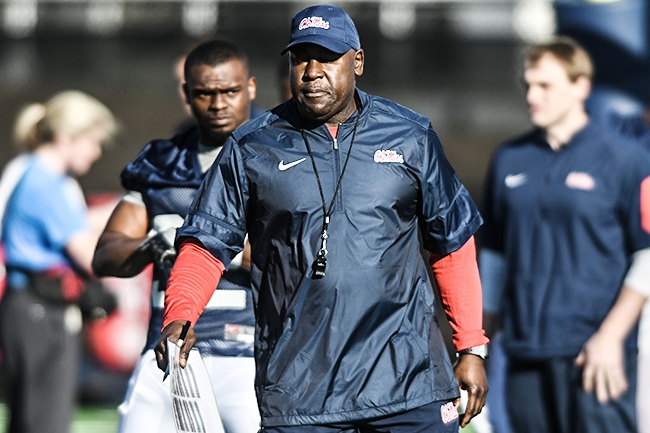What are the buyouts for Ole Miss’ new football assistant coaches?
Published 6:00 am Tuesday, March 28, 2017

- Ole Miss defensive coordinator Wesley McGriff watches a drill during spring football practice in Oxford, Miss. on Thursday, March 2, 2017. (Bruce Newman, Oxford Eagle via AP)
Hugh Freeze’s overhaul to his coaching staff this offseason included seven hires for five spots.
That’s because two new coaches — Matt Lubick and Tray Scott — bolted for jobs at other programs weeks after being hired at Ole Miss. Lubick, Freeze’s first choice as wide receivers coach, left just 10 days into the job to be Baylor’s offensive coordinator before eventually being hired as the receivers coach and co-offensive coordinator at Washington and didn’t have to pay a buyout to Ole Miss because of the bump in title at Baylor at the time.
Scott, who was the defensive line coach at North Carolina before Freeze hired him on New Year’s Day to the same post, took the same position at Georgia last month, but Scott was on a one-year contract, which doesn’t include a buyout. Freeze replaced Lubick with former Cal receivers coach Jacob Peeler and Scott with Freddie Roach, joining linebackers/special teams coach Bradley Dale Peveto, offensive coordinator Phil Longo and defensive coordinator Wesley McGriff to finalize the Rebels’ new-look staff.
The EAGLE has obtained copies of the contracts each new assistant has with the school through a Freedom of Information Act request, and they include buyouts for the four new assistants on multi-year deals. Peeler is on a one-year contract worth $375,000 and doesn’t have a buyout.
Here’s a look at each:
Phil Longo
Longo’s 25-month contract began Jan. 1 and runs through Jan. 31, 2019. He’ll make $600,000 for the first year before his salary increases by $100,000 on Jan. 1, 2018 (the contract is automatically extended a year on Jan. 15, 2018 and each Jan. 15 thereafter during the contract unless one side provides notice to the other on or before Jan. 15 that an extension isn’t desired).
Unless it’s a “result of extraordinary personal circumstances,” a Division I head coaching job or a coaching position in the NFL, Longo would owe the school either $125,000 or one-fourth of the remaining salary that he would’ve been paid during the unfulfilled term remaining on his contract, whichever is less, if he chose to leave Ole Miss before his contract is up.
Wesley McGriff
McGriff’s 37-month contract began Jan. 1, 2017 and runs through Jan. 31, 2020. He’ll make $1 million for the first year before his salary increases by $100,000 on Jan. 1, 2018 and Jan. 1, 2019 (the contract is automatically extended a year on Jan. 15, 2018 and each Jan. 15 thereafter during the contract unless one side provides notice to the other on or before Jan. 15 that an extension isn’t desired).
McGriff can terminate his contract with 30 days notice to the school and end his contract obligations for “extraordinary personal circumstances,” a Division I head coaching job or a coaching position in the NFL. Otherwise, McGriff would owe the school either $250,000 or one-fourth of the remaining salary that he would’ve been paid during the unfulfilled term remaining on his contract, whichever is less, if he chose to leave Ole Miss before his contract is up.
Bradley Dale Peveto
Peveto’s 25-month contract began Jan. 3 and runs through Jan. 31, 2019. He’ll make $425,000 annually (the contract is automatically extended a year on Jan. 15, 2018 and each Jan. 15 thereafter during the contract unless one side provides notice to the other on or before Jan. 15 that an extension isn’t desired).
Peveto would owe the school either $125,000 or one-fourth of the remaining salary that he would’ve been paid during the unfulfilled term remaining on his contract, whichever is less, if he chose to leave Ole Miss before his contract is up.
Freddie Roach
Roach’s 24-month contract began Feb. 20 and runs through Jan. 31, 2019. He’ll make $325,000 the first year before his salary increases by $25,000 on Jan. 31, 2018.
Roach would owe the school the remaining salary that he would’ve been paid during the unfulfilled term remaining on his contract if he chose to leave Ole Miss prior to Feb. 7, 2018.
If any of the coaches are terminated without cause before their contracts expire, the school would have to pay the rest of the salary owed under the contract.





